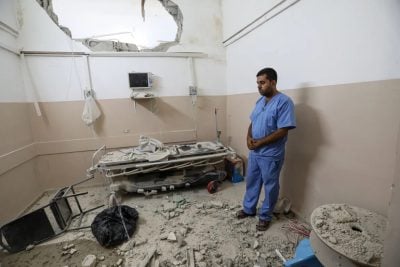War on Gaza: Palestinian Doctor Asks Biden How ‘Many More Need to Die’ Before US Demands Ceasefire
Nasser Hospital's Ahmed Moghrabi says children are 'dying from hunger, cold [and] contamination of water'

All Global Research articles can be read in 51 languages by activating the Translate Website button below the author’s name (only available in desktop version).
To receive Global Research’s Daily Newsletter (selected articles), click here.
Click the share button above to email/forward this article to your friends and colleagues. Follow us on Instagram and Twitter and subscribe to our Telegram Channel. Feel free to repost and share widely Global Research articles.
***
A Palestinian surgeon in southern Gaza has made an impassioned plea to the Biden administration, asking the US president how many more civilians need to be killed in Israel’s military campaign on Gaza before the US demands a ceasefire.
Speaking to Al Jazeera, Dr Ahmed Moghrabi, head of plastic surgery in Khan Younis’s Nasser Hospital, was heavily distraught as he recounted having to work around the clock for 80 days to treat the Palestinian victims of constant Israeli bombardment.
“I want actually to ask the Biden administration and the leaders of the world and [those] who sent these prohibited mass destruction weapons to Israel,” Moghrabi said. “How many more of us have to die? Really, how many more of us have to die, as civilians? How many more videos do you have to see?”
The US is one of Israel’s closest allies and supplies the country with billions of dollars in military assistance each year. Since the war on Gaza began in October, the US House of Representatives approved an additional $14bn to the country to aid in its campaign on the besieged enclave.
Israel has so far been sent 230 cargo planes and 20 ships loaded with weapons and military equipment from the US.
Moghrabi, who said he has developed psychological disorders from his work since the war began, shared a grim account of the humanitarian situation inside Gaza’s hospitals, noting that doctors do not have proper tools or enough medical supplies to treat their patients.
“Me, as a doctor here, as a surgeon here, I can’t save lives properly as I’m supposed to because I don’t have proper instruments.”
Beyond that, patients are going hungry without food and thirsty without clean drinking water, according to Moghrabi.
'How many of us need to die?'
'How many more videos do you need to see?'Dr. Ahmed Moghrabi, Head of plastic surgery in Gaza's Nasser Hospital, asks Biden and world leaders about the 'miserable' daily ordeals Palestinians are facing due to the ongoing attacks by Israel. pic.twitter.com/aLiCuvKRJa
— Middle East Eye (@MiddleEastEye) December 26, 2023
“Our children are not only dying from bombs or snipers or dragging them and executing them outside of their houses and executing them at the checkpoints; they are dying from hunger, from the cold, from the contamination of the water.
“You as democratic countries are there. I don’t know, how would you allow the entire population to starve?”
‘Biden Ensuring Israel’s Slaughter Continues’
Hospitals all across Gaza have been subjected to Israeli attacks, from aerial bombardment to being laid to siege by tanks on the ground or snipers on rooftops.
Middle East Eye reported earlier this month about the Israeli siege on al-Awda Hospital in northern Gaza, where 250 doctors, patients and their families were forced to the brink of starvation.
A staff member inside Awda gave a first-hand account to MEE of the dire conditions inside the hospital, when Israeli snipers surrounded the hospital and essentially turned the Palestinians inside into hostages until the hospital’s food and water ran out. Snipers were also shooting at anyone seen to move.
Last week, the World Health Organisation announced that northern Gaza no longer has a functional hospital due to Israel’s military assault, which has created a lack of fuel, staff and supplies.
“There are actually no functional hospitals left in the north,” Richard Peeperkorn, WHO representative in Gaza, told reporters.
The situation is similarly dire in the south of Gaza. The WHO said that out of all 36 health facilities in the enclave, only nine are partially functional – all of them in the south.
Despite the calls from much of the international community to end the war on Gaza, the United States has yet to push for a ceasefire.
At the United Nations Security Council last week, a vote for a ceasefire resolution was delayed multiple times to avoid a US veto. The language of the resolution ended up being changed to calling for urgent steps “to create the conditions for a sustainable cessation of hostilities” between Hamas and Israel.
Analysts have said that the compromises made to avoid the US veto have resulted in a resolution that will have limited bearing on Gaza’s humanitarian crisis.
“Biden’s changes will help ensure that Israel’s slaughter in Gaza continues while minimising the UN’s insight into what increasingly appears to be a genocide,” Trita Parsi, vice president of the Quincy Institute, said in a post on X, formerly Twitter.
*
Note to readers: Please click the share button above. Follow us on Instagram and Twitter and subscribe to our Telegram Channel. Feel free to repost and share widely Global Research articles.
Featured image: Dr Suleiman Qaoud surveys the damage at the Rantisi Specialist Hospital, part of the Nasser Medical Complex in Gaza City, following Israeli missile attacks on November 6, 2023 [Abdelhakim Abu Riash/Al Jazeera]

